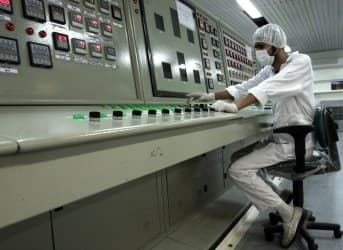Talks are resuming in Vienna over Iran’s nuclear program between Iran and the P5+1 – China, France, Russia, the U.K., the U.S. and Germany. The interim deal agreed to last November between these parties removed some sanctions from Iran, amounting to about $7 billion in economic relief. Iran has capitalized on the loosening grip of the West, and it has boosted its exports of oil as a result. February data suggests that Iran has breached the 1 million barrel-per-day limit imposed upon it for the fourth month in a row. It raised oil exports by 16% to 1.16 million barrels per day, though that rate is less than half of what it was before sanctions were imposed 2012. Iran’s oil exports have gone almost exclusively to buyers in Asia, including China, India, Japan, and South Korea.
And it’s not just oil where Iran is seeing some progress. Last week it signed a deal with Oman to export 10 billion cubic meters of gas per year. It will still require the construction of a $1 billion pipeline that crosses the Persian Gulf, but the deal spans 25 years beginning in 2015, and is worth about $60 billion. Iran sits atop the world’s largest natural gas reserves but has been unable to exploit them to their full potential. But with an eye on future growth of its oil and gas sectors, Iran has voiced optimism that a deal with the international community could be reached. The West and Iran have set a self-imposed deadline of July to reach a long-term agreement.
Related Article: Iran Talks Potential Nuclear-Oil Swap with Russia
Yet the talks resuming in Vienna are going to be a bit awkward. With a brewing and growing conflict between Russia and the West over Crimea, the negotiations with Iran find Russia and the West ostensibly on the same side, or at least, cooperating to find a compromise. But Russia’s annexation of Crimea and the retaliatory steps taken by the U.S. and the European Union to isolate Russia both politically and economically will certainly influence the negotiations, even though Crimea theoretically has nothing to do with the Iranian nuclear program.
In an interview with Bloomberg News, Robert Einhorn, a former U.S. State Department negotiator and a senior fellow at the Brookings Institution, said “Russia may undermine the sanctions” if the talks falter. He argues that Russia has always been reluctant about the sanctions on Iran. “Russia has never been supportive of sanctions but has recognized the utility of sanctions in motivating Iran to come to talks and negotiate seriously.”
Up until now, the P5+1 nations have gone to great lengths to display unity on the Iranian issue, and although Russia has been wary of cooperating with the West, it also doesn’t want Iran to approach nuclear weapons capability for fear of sparking an arms race in the Middle East, according to an unnamed U.S. official.
Related Article: How Will Russia’s Annexation of Crimea Affect Energy Markets?
But in the short-term at least, Russian President Vladimir Putin surely sees more at stake in Crimea. The crisis is already inflicting damage on the Russian economy. The Ruble has dropped almost 10% since the beginning of the year, and some economists predict that Russia will enter into a recession in the second and third quarters of this year. Annexing Crimea, as Putin vowed to do on March 18, would add an additional economic burden. Yet annexing Crimea is clearly a strategic priority for the Kremlin.
In response, the West will likely add heavier sanctions on Russia, which may or may not have significant bite. Either way, Western actions will probably not force Putin to back down any time soon, and it may even provoke Russia to become less than cooperative on Iranian negotiations. Russia may not want a nuclear Iran, but it is focusing on Crimean right now. And in any case, preventing a nuclear weapon in Iran is definitely a higher priority for the United States than it is for Putin. Torpedoing the talks or undermining sanctions could be a way for Russia to retaliate against the West over Crimea.
By Nicholas Cunningham of Oilprice.com


















